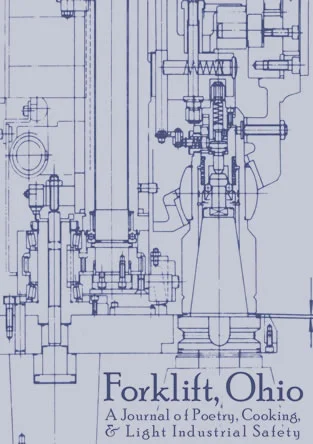Mart Hart grants us clearance into the the vast (and indie) history of Forklift, Ohio. www.forkliftohio.com
1.) Who do you imagine your ideal reader to be?
I guess people like us…
And what kind of people are we?
We’re people who enjoy finding poetry in all the usual places (via submissions, at readings, in the mouths of our friends and friends to be) and also in the places where we might least expect it: recipes, old engineering manuals, slaughterhouse supply catalogues, books of 19th century children’s games, big awkward construction equipment, industrial and commercial design (especially from the bygone eras), etc. What’s more, we like taking bits and pieces of the poetry we find (in the unusual, unexpected places) and juxtaposing it with poetry gathered and cajoled from all the usual places just to see what sparks may fly. We think poetry should be surprising and fun and that craft is the thing that nobody talks about when the work is actually good (and in good working order).
Our ideal reader is someone who doesn’t just read left to right, top to bottom down the page, but someone who reads wildly, who knows that seeing is reading, and that words and images deployed are as exciting/maybe more exciting than words and images employed. Words function pretty well most of the time, but we’re most excited when they malfunction, go haywire, do the opposite, point to the unexpected thing in the mud.
Our ideal reader is also someone interested in the materiality of language and the world, interested in the feel of ignition orcacophony in the mouth, interested in the revolt in revolution and that it all points to spinning. Our readers pay attention, and when they don’t—when they choose not to—they at least realize that they’re missing EVERYTHING. Life is best lived alive with openness and vulnerability, not in some zombified, fortified pasture/posture. Detached readers will not like our journal. We are not detached people. We wear our hearts on our faces. We can take a punch. Sometimes we give one back. And this is all in good fun.
2.) How did your Journal start?
Eric Appleby and I started Forklift, Ohio back in 1994, and for the most part we’ve been publishing ever since (with a couple of hiccups along the way). We’ve now done 23 issues, and 24 will be out this spring. We do chapbooks here and there (this spring we’re doing one by Stuart Dischell called Touch Monkey), and this spring we’ll publish our first Forklift book book, Wolf’s Milk by Juan Sweeney de la Minas de Cobra (the Oklahoman-Bolivian poet, translated from the Spanish by Chad Sweeney…
In ’94 Eric was just out of college, and I was just off a year in a Master’s program in Philosophy. We were both newly transplanted to Cincinnati where we still live, and we wanted to get a journal going as a way to get work into the world that we thought people should read. Of course, it was also a way to insert ourselves into, and hopefully expand, a community of writers and artists. I should note that we had done a journal in Muncie, Indiana (we both majored in Philosophy at Ball State) before Forklift, OH calledNausea Is the Square Root of Muncie.
We were sitting our kitchen (we were roommates at the time) talking about what to call the journal, and I being the dork Pavement fan that I was said how about Forklift. And Eric said, Yeah, that’s alright, but it needs something. Let’s make the “forklift” a place—Forklift, Ohio. Then came the industrial bit, and since we love food as much as we love words, cooking needed to be in there as well—especially since Fork/lift-ing is what one does when one eats in Ohio and other places, too.
The first ten issues were tabloid size on newsprint, and then we decided we wanted each issue to be an object that people might enjoy looking at and holding as much they might enjoy reading it. That’s when we started trying out weird binding materials—like Schluter Ditra and flooring substrate. One issue had a bolt through the center, another looked like a tiny clipboard wrapped in caution tape. Still another came a bag of chili mix, complete with dry beans and all the spices. The recipe for the chili was a jigsaw puzzle on the back sides of the poems.
Anyway, in all this time, we still fund the journal entirely out of our own pockets. We beg steal borrow and “find” a lot of our materials. We have a wonderful weird short fiction editor now in Merrill Feitell. Tricia Suit, a long time collaborator and friend from the Ball State days, is our Test Kitchen Supervisor, and Amanda Smeltz recently replaced Brett Price as Assistant Poetry Editor. Brett by the way has gone on to do a brand new thing, which people will soon be dazzled by. I manage the editing. Eric does the design. We discuss possibilities for each issue, in terms of materials and themes as a team.
I’d like to note also that now, nearly 18 years into this, we are close to 7000 days without a lost-time accident, a record in the industry and one we are extremely proud of.
3.) What other Journals do you imagine to be in the same aesthetic constellation as you?
In no particular order:
Agriculture Reader
Big Bell
H_NGM_N
Lumberyard
Lungfull!
Sixth Finch
Gondola
Toad
The Equalizer
BPM
Jellyfish
The next weird little thing…
Oh yeah, and Coldfront—I know it’s not technically a journal, but it’s terrific, and they do all kinds of weird stuff…
4.) If you had infinite funds or resources, what do you imagine your magazine would look like?
Exactly like it does now, except we wouldn’t have to steal so much paper and other materials to make it go, and thus we’d be good law-abiding citizens instead of the small-time literary criminals we are.
5.) What is you favorite non-art, non-lit magazine? (This could be print or electronic)
My daughter’s five years old, so lately it’s been National Geographic for Kids, but I have a feeling I’ll grow out of that when she does (and that’ll be any minute now, no doubt). In the other room I hear drumming…
________________________________

